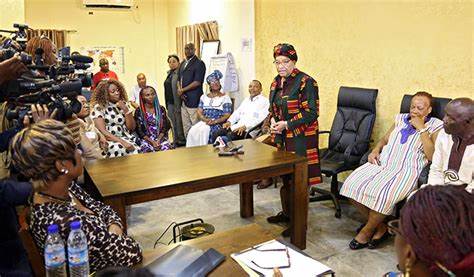PHOTO: Africa and Liberia’s first elected female President Ellen Johnson Sirleaf back in 2017
By Morrison O.G Sayon Contact: (+231) 775107709—Email: morrisonogsayon@gmail.com
This is part one of a series of articles on Enhancing Women’s Political Participation in the Decision-making process as the October 2023 Presidential and Legislative elections date draws nearer.
In this article, I’ve decided to examine the strategies to overcome the obstacles of political participation of women in the decision-making process.
This article focuses on two issues. First, examine the principle steps involved in the process of recruiting to countries’ Legislatures; second, we look at the effect of a country’s electoral system. Which electoral system are best suited to securing the election of women, and why? What specific factors should women be concerned about in the design of electoral systems?
By addressing these questions, we hope to provide some insight into the effective and practical strategies that can be used to increase women’s participation in Legislative representation.
Legislative Recruitment Process and Its Impact on Women:
The Legislative recruitment process refers to the process by which individual move from meeting the legal criteria to serve to actually serving in the Legislature. The norm in most countries including Liberia is for political parties to play an important role in this process by identifying possible candidates, selecting them as their official candidates, and putting them forward to the public for election.
For women to get elected to the Legislature they need to pass three crucial barriers: first, they need to select themselves; second, they need to be selected as candidates by the parties, and third, they need to be selected by the voters.
While the steps involved in moving from eligible to aspirant to candidate occurred in most political systems, the actual process varies dramatically from country to country. In particular, party rules and norms, along with the country’s social culture and electoral system, affect the recruitment process at different stages and influence the degree of openness to women candidates.
The stage at which the party gatekeepers (delegates or party leaders) actually choose the candidates is the crucial stage for getting women into office.
Selecting Yourself
The first stage consists of a person deciding to stand for elected office. The decision is influenced by personal ambition, resources and opportunities to stand. The decision to stand for office is generally portrayed as the decision of an actor who is rational but has limited abilities to predict outcomes and estimate the possible benefit and costs of specific actions taken. Such a bounded rational actor’s personal ambition is tempered by an assessment of the resources the candidate can generate to help in the campaign, an estimation of how friendly the socio-political environment will be to the individuals’ candidacy, and calculations concerning the opportunities to stand for office, that is whether open positions exist. Already at this first stage there are more men than women.
Men, across virtually all countries, are socialized to see politics as a legitimate sphere for them to act in. this leads to men having a greater knowledge of and interest in politics, and greater political ambition. They also have access to more resources. In virtually every country women start out as more than 50 percent of those eligible to serve, but even after just the first step of selecting themselves the system is starting to become skewed towards men.
Contribution of Women Organizations
A women’s movement or organizations focusing on women’s political empowerment can contribute significantly to an increase in the number of potential women candidates aspiring for office. Even non-political organizations with predominantly women members can play important roles. These organizations can provide women with experience in public settings, help build their self- confidence, and provide a support base if a woman decides to contest an election.
Women’s organizations can also pressure parties both to address women’s issues and address the question of women’s increased political representation. These are important resources a woman can draw on and they make it more likely that she will stand and that the party apparatus will see her as a viable candidate. To be continued…

